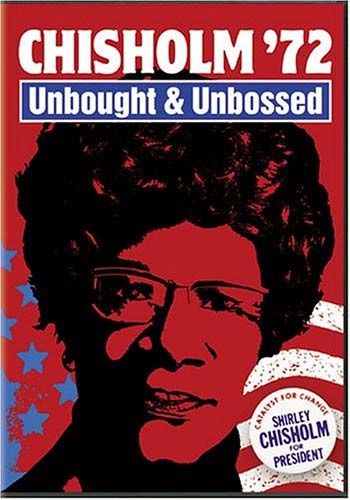
Unbought and Unbossed: remembering Shirley Chisholm, Commentary by Black Kos editor Deoliver47
On November 30, in 1924 a very special young woman was born in Brooklyn NY.
She would grow up to become the first black woman to be elected to Congress, and to later go on to run for the Presidency.
Her name was Shirley Anita St. Hill Chisholm.
Shirley Chisholm
Shirley Anita St. Hill was born in Brooklyn, New York, of immigrant parents. Her father, Charles Christopher St. Hill, was born in British Guiana and arrived in the United States via Antilla, Cuba, on April 10, 1923 aboard the S.S. Munamar in New York City. Her mother, Ruby Seale, was born in Christ Church, Barbados, and arrived in New York City aboard the S.S. Pocone on March 8, 1921. At age three, Chisholm was sent to Barbados to live with her maternal grandmother, Emaline Seale, in Christ Church. She did not return until roughly seven years later when she arrived in New York City on May 19, 1934 aboard the S.S. Narissa. In her 1970 autobiography Unbought and Unbossed, she wrote: "Years later I would know what an important gift my parents had given me by seeing to it that I had my early education in the strict, traditional, British-style schools of Barbados. If I speak and write easily now, that early education is the main reason."
I have very strong memories of Mrs. Chisholm. Since I was born in Brooklyn, and many of my neighbors and friends of my parents were West Indians, Chisholm was one of the women I was raised to look up to and emulate. She is a woman at the top of my "Sheroe list", and I had promised a while back to tell her story. It is fitting that we do it on today, her birthday.
Chisholm is an alumna of Girls High School, she earned her BA from Brooklyn College in 1946 and later earned her MA from Columbia University in elementary education in 1952. She was a member of the Delta Sigma Theta Sorority. From 1953 to 1959, she was director of the Hamilton-Madison Child Care Center. From 1959 to 1964, she was an educational consultant for the Division of Day Care.
So much of who Shirley Chisholm was, centered around education, not only her own upbringing and childhood in Barbados, but her hands-on experiences dealing with youth and issues surrounding young black people facing the challenges of life in the United States, and how she felt education was a key to the obstacles of race placed in their paths.
Some of the following video interviews with her were done by The National Visionary Leadership Project (NVLP) a "resource for oral history interviews with African American elders who shaped the 20th century".
Growing up in Barbados
Shirley Chisholm : Advice to Young African Americans
The following mini-documentary should be required viewing for those who know little about her impact on politics and the ground-breaking role she played in the political process here in the US - not only the fact that she was black and female, but the extraordinary positions she took on health care, war, the Middle East, and domestic issues like inner city education and food stamps.
Shirley Chisholm Part One
Shirley Chisholm Part Two
Shirley Chisholm Part Three
An outspoken politician
After a successful career as a teacher, Chisholm decided to run for the New York State Assembly. Her ideals were perfect for the times. In the mid-1960s the civil rights movement was in full swing. Across the nation, activists were working for equal civil rights for all Americans, regardless of race. In 1964 Chisholm was elected to the assembly. During the time that she served in the assembly Chisholm sponsored fifty bills, but only eight of them passed. One of the successful bills she supported provided assistance for poor students to go on to higher education. Another provided employment insurance coverage for personal and domestic employees. Still another bill reversed a law that caused female teachers in New York to lose their tenure (permanence of position) while they were out on maternity leave.
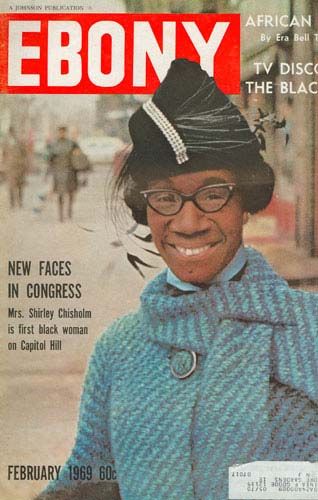
Chisholm won election to the 91st Congress (1969–1971) running under the slogan "unbought and unbossed," to become the first African-American woman in Congress.
Ebony Magazine, February 1969, Collection of U.S. House of Representatives
A new congresswoman
Chisholm served in the state assembly until 1968, when she decided to run for the U.S. Congress. Her opponent was the civil rights leader James Farmer (1920–). Chisholm won the election and began a long career in the U.S. House of Representatives, lasting from the Ninety-first through the Ninety-seventh Congress (1969–1982). As a member of Congress, Chisholm attempted to focus her attention on the needs of her constituents (the voters she represented). She served on several House committees including Agriculture, Veterans' Affairs, Rules and Education, and Labor. During the Ninety-first Congress, when she was assigned to the Forestry Committee, she protested her appointment and said that she wanted to work on committees that dealt with issues that were affecting her district. Forestry issues had little or no importance to the people she represented in Bedford-Stuyvesant.
In 1972, Chisholm would step out onto the national stage, and declare herself a candidate for the Presidency.
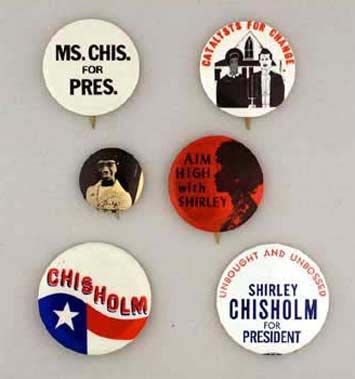
WNYC-TV archives have the original footage of her press conference
Shirley Chisholm declares presidential bid, January 25, 1972
The same press conference is the theme in the documentary film distributed by Women Make Movies:
CHISHOLM '72 UNBOUGHT & UNBOSSED | Women Make Movies
Filmmaker Shola Lynch talks about why she made the film.
In the 1972 U.S. presidential election, she made a bid for the Democratic Party's presidential nomination. She survived three assassination attempts during the campaign. George McGovern won the nomination in a hotly contested set of primary elections, with Chisholm campaigning in 12 states and winning 28 delegates during the primary process. At the 1972 Democratic National Convention, as a symbolic gesture, McGovern opponent Hubert H. Humphrey released his black delegates to Chisholm, giving her a total of 152 first-ballot votes for the nomination. Chisholm's base of support was ethnically diverse and included the National Organization for Women. Chisholm said she ran for the office "in spite of hopeless odds... to demonstrate the sheer will and refusal to accept the status quo." Among the volunteers who were inspired by her campaign was Barbara Lee, who continued to be politically active and was elected as a congresswoman 25 years later. Betty Friedan and Gloria Steinem attempted to run as Chisholm delegates in New York.
Throughout her tenure in Congress, Chisholm worked to improve opportunities for inner-city residents. She was a vocal opponent of the draft and supported spending increases for education, health care and other social services, and reductions in military spending.In 1970, she authored a child care bill. The bill passed the House and the Senate, but was vetoed by President Richard Nixon, who called it "the Sovietization of American children".
In the area of national security and foreign policy, Chisholm worked for the revocation of Internal Security Act of 1950. She opposed the American involvement in the Vietnam War and the expansion of weapon developments. During the Jimmy Carter administration, she called for better treatment of Haitian refugees.
Mrs. Chisholm was an important figure in the history of feminism, and inspired many young women - black, white, and of all other ethnicities to follow in her footsteps. She was a fierce advocate for the ERA and worked tirelessly for its passage.
Here is her speech delivered to Congress in 1969:
Equal Rights For Women
by Shirley Chisholm
US House Representative from New York
Address To The United States House Of Representatives, Washington, DC: May 21, 1969
Mr.Speaker, when a young woman graduates from college and starts looking for a job, she is likely to have a frustrating and even demeaning experience ahead of her. If she walks into an office for an interview, the first question she will be asked is, "Do you type?''
There is a calculated system of prejudice that lies unspoken behind that question. Why is it acceptable for women to be secretaries, librarians, and teachers, but totally unacceptable for them to be managers, administrators, doctors, lawyers, and Members of Congress.
The unspoken assumption is that women are different. They do not have executive ability orderly minds, stability, leadership skills, and they are too emotional.
It has been observed before, that society for a long time, discriminated against another minority, the blacks, on the same basis - that they were different and inferior. The happy little homemaker and the contented "old darkey" on the plantation were both produced by prejudice.
As a black person, I am no stranger to race prejudice. But the truth is that in the political world I have been far oftener discriminated against because I am a woman than because I am black.
Prejudice against blacks is becoming unacceptable although it will take years to eliminate it. But it is doomed because, slowly, white America is beginning to admit that it exists. Prejudice against women is still acceptable. There is very little understanding yet of the immorality involved in double pay scales and the classification of most of the better jobs as "for men only."
More than half of the population of the United States is female. But women occupy only 2 percent of the managerial positions. They have not even reached the level of tokenism yet No women sit on the AFL-CIO council or Supreme Court There have been only two women who have held Cabinet rank, and at present there are none. Only two women now hold ambassadorial rank in the diplomatic corps. In Congress, we are down to one Senator and 10 Representatives.
Considering that there are about 3 1/2 million more women in the United States than men, this situation is outrageous.
It is true that part of the problem has been that women have not been aggressive in demanding their rights. This was also true of the black population for many years. They submitted to oppression and even cooperated with it. Women have done the same thing. But now there is an awareness of this situation particularly among the younger segment of the population.
As in the field of equal rights for blacks, Spanish-Americans, the Indians, and other groups, laws will not change such deep-seated problems overnight But they can be used to provide protection for those who are most abused, and to begin the process of evolutionary change by compelling the insensitive majority to reexamine it's unconscious attitudes.
It is for this reason that I wish to introduce today a proposal that has been before every Congress for the last 40 years and that sooner or later must become part of the basic law of the land -- the equal rights amendment.
Let me note and try to refute two of the commonest arguments that are offered against this amendment. One is that women are already protected under the law and do not need legislation. Existing laws are not adequate to secure equal rights for women. Sufficient proof of this is the concentration of women in lower paying, menial, unrewarding jobs and their incredible scarcity in the upper level jobs. If women are already equal, why is it such an event whenever one happens to be elected to Congress?
It is obvious that discrimination exists. Women do not have the opportunities that men do. And women that do not conform to the system, who try to break with the accepted patterns, are stigmatized as ''odd'' and "unfeminine." The fact is that a woman who aspires to be chairman of the board, or a Member of the House, does so for exactly the same reasons as any man. Basically, these are that she thinks she can do the job and she wants to try.
A second argument often heard against the equal rights amendment is that is would eliminate legislation that many States and the Federal Government have enacted giving special protection to women and that it would throw the marriage and divorce laws into chaos.
As for the marriage laws, they are due for a sweeping reform, and an excellent beginning would be to wipe the existing ones off the books. Regarding special protection for working women, I cannot understand why it should be needed. Women need no protection that men do not need. What we need are laws to protect working people, to guarantee them fair pay, safe working conditions, protection against sickness and layoffs, and provision for dignified, comfortable retirement. Men and women need these things equally. That one sex needs protection more than the other is a male supremacist myth as ridiculous and unworthy of respect as the white supremacist myths that society is trying to cure itself of at this time.
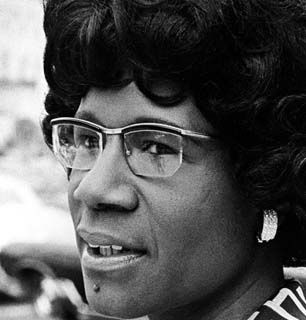
Websites that catalog great political speeches always include the speech she made before Congress for the Equal Rights Amendment on August 10th, 1970:
She opened:
Mr. Speaker, House Joint Resolution 264, before us today, which provides for equality under the law for both men and women, represents one of the most clear-cut opportunities we are likely to have to declare our faith in the principles that shaped our Constitution. It provides a legal basis for attack on the most subtle, most pervasive, and most institutionalized form of prejudice that exists. Discrimination against women, solely on the basis of their sex, is so widespread that is seems to many persons normal, natural and right.
Legal expression of prejudice on the grounds of religious or political belief has become a minor problem in our society. Prejudice on the basis of race is, at least, under systematic attack. There is reason for optimism that it will start to die with the present, older generation. It is time we act to assure full equality of opportunity to those citizens who, although in a majority, suffer the restrictions that are commonly imposed on minorities, to women.
The argument that this amendment will not solve the problem of sex discrimination is not relevant. If the argument were used against a civil rights bill, as it has been used in the past, the prejudice that lies behind it would be embarrassing. Of course laws will not eliminate prejudice from the hearts of human beings. But that is no reason to allow prejudice to continue to be enshrined in our laws -- to perpetuate injustice through inaction.
And she concluded:
The Constitution they wrote was designed to protect the rights of white, male citizens. As there were no black Founding Fathers, there were no founding mothers -- a great pity, on both counts. It is not too late to complete the work they left undone. Today, here, we should start to do so.
I'd like to close with two more clips of Mrs. Chisholm in her own words:
Shirley Chisholm : Greatest Achievement / Strongest Regret
"I want to be remembered as a catalyst for change in America"
Shirley Chisholm : Influential Women in My Life
Those influential women were her grandmother, Mary McLeod Bethune, and Eleanor Roosevelt.
Thank you Mrs. Chisholm. For you were one of the influential women in mine.

November 30, 1924 – January 1, 2005
============================================================
News by dopper0189, Black Kos Managing Editor
============================================================

============================================================
The noted Spelman College scholar and author talks to The Root about what Oprah should be doing, Michelle Obama and why the president is a feminist. The Root: The Root Interview: Beverly Guy-Sheftall on Black Feminism
==============================================================
Known for her eccentricity and boldness, Beverly Guy-Sheftall has never been scared to take the brave action necessary for change. (With her fondness for bright colors and head-to-toe leopard prints, she's also not scared of taking fashion risks.) A pioneer of black feminism in the 1960s, she took the helm of black feminist studies, raging against strong sentiments that positioned black feminism as obsolete once black women gained access to the labor force. Since then she has worked tirelessly to institute black feminist studies as a legitimate discipline, and continues to do so as the founder and director of the Women's Research and Resource Center at Spelman College, where she is also the Anna Julia Cooper Professor of Women's Studies.
An accomplished and well-respected scholar, Guy-Sheftall has co-edited and written books that continue to serve as the cornerstone of black feminism, most notably Words of Fire: An Anthology of African-American Feminist Thought and Still Brave, the follow-up to the anthology All the Women Are White, All the Blacks Are Men, but Some of Us Are Brave. She also co-founded SAGE: A Scholarly Journal on Black Women, which has become a critical resource for black women's studies.
Now, as the president of the National Women's Studies Association, Guy-Sheftall has succeeded in adding color to what has historically been a mostly white organization. Under her leadership, issues around feminists of color have permeated the organization's discourse, creating a more inclusive space for women's-studies scholars.
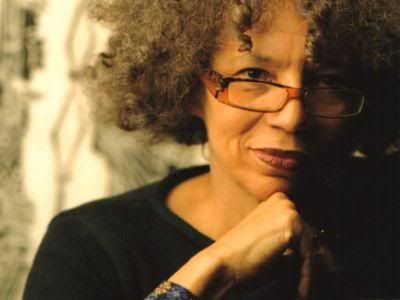
=============================================================
They were the first black regiments of the U.S. Army. With each passing year, as their numbers dwindle, the veterans renew their commitment to ensuring their contribution to American military history is never forgotten. LA Times: Keeping the Buffalo Soldiers on memory's front lines
=============================================================
They participated in cross-country cattle drives, escorted wagon trains and stagecoaches through often volatile territories of the Wild West and fought in the Spanish-American War and both world wars.
The first African American regiments of the U.S. Army were commonly known as Buffalo Soldiers.
Today, they are among a rapidly shrinking group of veterans who with each passing year renew their commitment to ensuring that their contribution to American military history is recognized — and never forgotten.
"Our aim is to perpetuate the memory of the Buffalo Soldiers and tell the true story of what happened," said Bruce E. Dennis, 86, vice president of the Inglewood-based Greater Los Angeles-area chapter of the 9th and 10th (Horse) Cavalry Assn.
Authorized by an act of Congress in 1866, the 9th and 10th Cavalry, and later the 24th and 25th Infantry, formed the first African American regiments of the U.S. Army. They were initially led by white officers and constituted about 10% of troops who guarded the western frontier for more than two decades, according to the Buffalo Soldiers National Museum in Houston.
The total number of original Buffalo Soldiers still living nationwide is unclear, but there are more than two dozen chapters of 9th and 10th Cavalry associations across the country. They include branches in San Diego and the Inland Empire, where the local Buffalo Soldiers Heritage Assn. is raising funds for a memorial at Riverside National Cemetery.
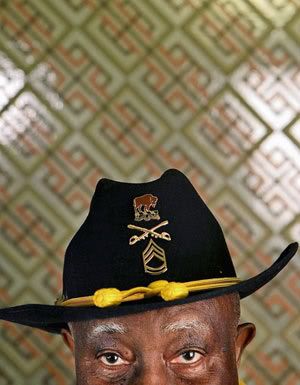
Buffalo Soldier Andrew Q. Isaacs age 87 (Christina House)
=============================================================

==============================================================
As the government fights to control the cholera epidemic, presidential candidates are holding their last election rallies. NYT: Death and Dancing Coexist on Haiti’s Tense Streets
=============================================================
One body gets a light kick and tumbles into the pit.
Another — this one the body of a 7-year-old boy — sails briefly in the air before dropping with a sickening thud. He was named Stanley Faustin and fought cholera in the hospital for 11 hours, a government paper shows.
Nachena Bien Ame, 18, landed here, too. And so did Roberto Dupitan, 49; Jean Mary Mirat, 30; Pierre Gasnes, 40; heavy sacks colliding with rock over and over.
This city’s body collectors work quickly and unceremoniously, dragging the bodies of people who died of cholera from trucks and converted pickups known as tap-taps and sending them into pits freshly dug at the edge of town.
Cholera overtook them in hospitals, on the streets, at home — more than 1,500 Haitians dead in the past month and 28,000 more made sick.
The government, fighting to control the epidemic, has decreed that their bodies are contaminated, and so Haiti, again, is busy with mass graves, this one a little more than a half-mile from the mounds where tens of thousands of victims of the January earthquake are buried.
Back in the city, the bustle of life presses on. The place is pregnant with anxiety and sporadic political violence just a few days from the selection of a new president.
But here the men focus on nothing but avoiding getting sick themselves as they spray a bleach solution on the bodies, on the plastic in which the bodies are wrapped, on their boots, on the trucks, inside the cabs, on their hands, legs, backs — even a splash on their faces.
One of the workers, Andral Jasmin, 33, gingerly holds a small plastic bag by his fingertips and walks to the pit. The bag contains a newborn, but, he said later, he preferred not to think about that. The information was scrawled on a piece of cardboard that he did not read as it dangled from the bag, noting simply that she was a girl, that she was born and died Nov. 24 and that she came from a region called Lily.
No name.
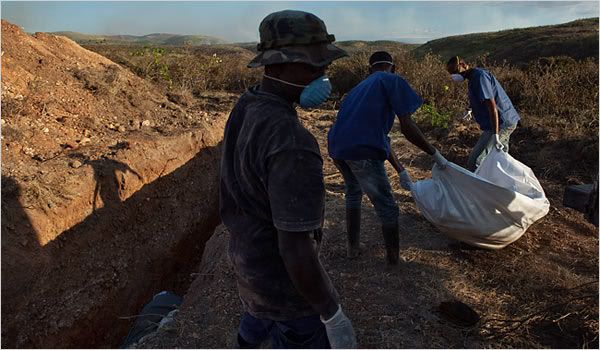
=============================================================
Haiti's general election on Sunday was valid despite "serious irregularities", international observers have said. BBC:
Haiti election valid despite "irregularities", says OAS
=============================================================
The joint mission from the Organisation of American States and the Caribbean regional grouping, Caricom, said delays at some polling stations were not reason enough to cancel the election.
Most opposition presidential candidates had called for the vote to be annulled because of alleged vote-rigging.
But the two leading candidates later withdrew their objections.
The election is seen as crucial to the future of Haiti, which is battling a cholera epidemic and trying to rebuild after January's devastating earthquake.
Polling day on Sunday was marred by disorganisation and some violence, as well as allegations of fraud in favour of the governing party candidate, Jude Celestin.
But the OAS and Caricom election monitors said there was not enough reason to call it off.
"The joint mission does not believe that these irregularities, serious though they are, should invalidate the elections," said the head of the observers, Colin Granderson.
=============================================================

==============================================================
When even The New Republic realizes this, maybe the village wise menreally important serious people are starting to wake up? The New Republic: The Real Reason Obama Can't Win Over the White Working Class
==============================================================
John Judis has always been a shrewd reader of election returns. In "You’ve Got Them All Wrong, Mr. President," his deconstruction of "independent" voters makes clear how meaningless it is for President Obama or anyone else to credit such a huge clump of undifferentiated leaners with the power to decide who runs Congress or gets to sit in the Oval Office. As Judis shows, the only true independents are white working-class men and women (actually, more the latter than the former) who "are susceptible to populist appeals" against "special interests" that "can include business as well as government."
But, like many a political reporter, Judis focuses more on the messages politicians send out than on the factors that determine how these messages are received. His observations could use a bit less rhetoric and a bit more sociology. Specifically, he neglects one of the main reasons white Americans who lack a college education and make only a modest income now tilt toward Republicans and their right-wing populist talk: Few belong to an institution that counters those opinions.
During the campaign, an unemployed Ohio steelworker told The New York Times, "We heard everything was going to change, but there hasn’t been much change and the unemployment is still bad and the area we live in is still really depressed." Yes, Obama should have made a better attempt to explain to people like this steelworker how the financial crisis occurred and how health care reform will help to create a more decent, as well as more efficient, society. As Judis recognizes, however, a more forceful narrative also would have done nothing to save that man’s job, or find him a new one.
But, if that unemployed Ohioan belonged to a vibrant, powerful labor union, he might be able to see himself as a maker of change, instead of its victim—and thus absorb Obama’s message differently. White men and women who do belong to unions are still far more likely to support progressive ideas on a variety of issues and to vote for Democrats than are their non-union counterparts. In 2010, white voters who lack a college degree but do have a union member in their households voted for Obama’s party by 24 percent more than did their non-union counterparts.
************************************
Of all the social groups essential to a winning Democratic coalition, white working-class people are the only ones who, for the most part, currently lack sturdy institutions that promote progressive ideas and policies. African Americans have their churches, the NAACP, and other groups, both formal and informal. Latinos have organizations, both secular and religious, that defend immigrant rights and push for greater power in the larger society and culture. Middle and upper-class liberals have major universities and friendly media, from the Times, TNR, and The Nation to such websites as The Huffington Post and Daily Kos. Lesbians and gay men have the Human Rights Campaign and the National Gay and Lesbian Task Force.
=============================================================
The power of black woman voters. Race-Talk: Power of the sister vote
=============================================================
An old Ghanaian proverb says, "Until the lions have their own historians, tales of the hunt will always glorify the hunter." Journalism is the first draft of history.
In the wake of Democrats’ shellacking in the midterm election, journalists and pundits blamed low black turnout for their losses. They compared 2010 turnout with 2008, but that is like comparing apples and oranges. Turnout is always higher in a presidential election year.
Exit polls and preliminary analyses by the Joint Center for Political and Economic Studies and Project Vote show black voters made up 10 percent of the electorate, the same share as in 2006, the last midterm election.
I moderated the Power of the Sister Vote post-election briefing organized by the National Coalition on Black Civic Participation Black Women’s Roundtable. An intergenerational mix of women gathered to tell the story of black voters and the midterm election. The presenters included the leaders of black voter empowerment groups that are largely responsible for closing the racial gap in voter registration and turnout.
An underreported story of the 2010 election is that black female voters made up a disproportionate share of the black electorate. Indeed, Congressional Black Caucus Chairwoman Barbara Lee observed, "We never would have come this far without black women."
The Joint Center’s report, "Blacks and the 2010 Midterms: A Preliminary Analysis," found that "the black vote in 2010 was three-to-two female to male as has been the case in many recent elections."
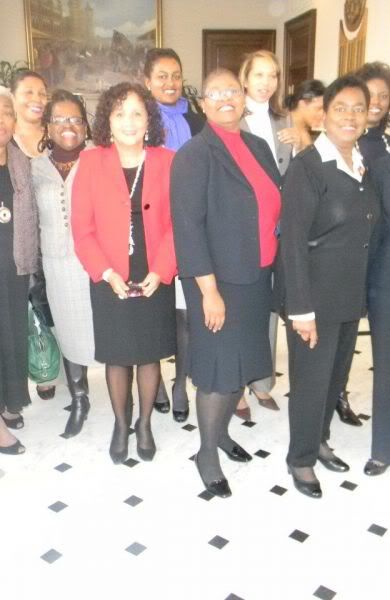
=============================================================

==============================================================
Believe in the ATL everyones knows about this. "Everybody wants to know: what is a Ghetto Burger? NYT: Burgers Selling Fast, but the Restaurant Is Not
==============================================================
As real estate deals go, the sale of Ann’s Snack Bar may be a true test of the value of cult food in a bad economy.
In other words, just how much is a Ghetto Burger worth?
After 38 years of serving her messy, hand-pressed burgers to an endless parade of restaurant critics, celebrities like Sean Combs and, lately, a horde of Twitter-driven food enthusiasts, Ann Price decided it was time to put down her spatula and get a little return on her investment.
She thought about all those years of work and her growing national reputation and set the price at $1.5 million in August 2009. After all, one national food critic even said she made the best burger in the country.
"People come here from all over the world, people from every race," said Ms. Price, 67, who personally makes every burger. "Everybody wants to know: what is a Ghetto Burger?"
Of course, a bad real estate market is a bad real estate market, even for a restaurant so popular that people will wait outside for hours to snag one of the eight stools. Now, she will let the shop go for $450,000.
The cheeseburger that put her on the map is constructed from two big patties of generic ground beef, fried with big pieces of onion and seasoned with something she won’t tell you about unless you buy the place. She lightens it up with bacon, a little chili sauce and lettuce and tomato. It costs $9.50 with fries, and she has lawyers working on trademarking the name.
Although one might argue that many of the hundreds of hamburgers made by chefs in this burger-crazy nation are better, it is hard to argue that hers has less cachet.
Anna Monzon, 30, an Atlanta resident who works for a West Coast skateboard company, was the first in the door one recent day. She ordered five to take with her to Los Angeles. Her brother, such a food fanatic that he follows 20 food carts on Twitter, told her not to board the plane without them.
"I’m not a big burger person," Ms. Monzon said, "but this is the one burger I’d wait a couple hours in line for."
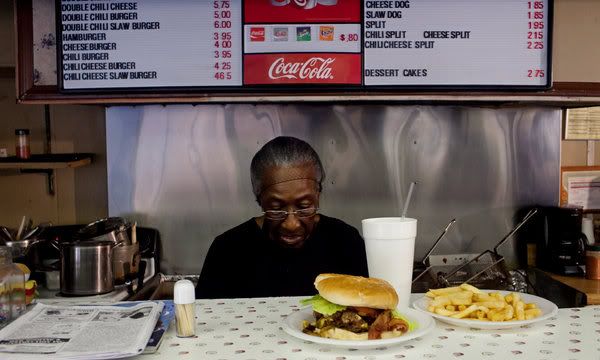
David Walter Banks for The New York Times
Ann Price, 67, at her Atlanta restaurant, Ann’s Snack Bar. She’s been preparing and serving hamburgers there since 1972 and hopes she can retire soon.
============================================================

============================================================
Reporter Rochelle Ritchie decided to go through "the big chop" on camera during sweeps week and let viewers see her transformation. The Root: Reporter Goes Natural During Sweeps, Ratings Go Up
=============================================================
An African American female television reporter decided to let her straightened hair "go natural" during sweeps week and let viewers see the transformation process. Rochelle Ritchie of WPTV-TV in West Palm Beach, Fla., called "The Big Chop" a success, and ratings confirmed that. The station put up a web page with her two stories and related ones.
News director Jeff Brogan told Journal-isms that the ratings for the 11 o'clock news on Nov. 17, which featured Ritchie's second piece of the day, increased from the lead-in show and stayed at the high point during the broadcast. That is "not an easy thing," he said. The "share" of the audience numbered 11 at 10:45 p.m., rose to 14 from 11 p.m. to 11:15 p.m. and stayed there from 11:15 p.m. to 11:30 p.m., he said. The seven-minute piece aired at 11:15.
When Ritchie explained the story to him, said Brogan, 33, who is white, "I had no clue this was an issue," he said of the chemical straightening of hair or the wearing of wigs and weaves. "I never heard about it, and I had African American friends. I instantly bought into this" story. "I had not seen this story done. It brings up a safety concern," he said. Brogan said his only worry was insensitive audience reaction, but all the feedback was positive, he said.
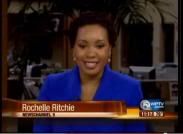
===================================================================
Voices and Soul

by Justice Putnam
Black Kos Tuesday's Chile, Poetry Editor
I come from a strong Matriarchy; so strong in fact, one might say I come from a feminist extended-family. There was no division of labor by gender when doing chores, growing up; all of us mowed the lawn, washed dishes, cooked, cleaned. When we lived on the farm outside of Corvallis; all of us learned to sew and sow.
The great Matriarch of the Family, our Great Aunt Mabel, lived to be 102. Shortly after marriage in the late 1880's, she and her new husband provisioned a covered wagon and trekked across the plains on their way to California. Along the way, as she put it, "he wasn't up to snuff, so I had to kick him out." She took up with another fellow during the almost year long voyage; and he was "worse than the first", so he was sent packing as well. It took a special man to be with this special woman; as it has been, as it is and as it will be with all the women in my family.
I've heard the accusation, on more than one occasion, that the women in the family are "full of themselves."
"Yes," is their unabashed reply, resonating across the generations, "yes we are!"
Poem For A Lady Whose Voice I Like
so he said: you ain’t got no talent
if you didn’t have a face
you wouldn’t be nobody
and she said: god created heaven and earth
and all that’s Black within them
so he said: you ain’t really no hot shit
they tell me plenty sisters
take care better business than you
and she said: on the third day he made chitterlings
and all good things to eat
and said: "that’s good"
so he said: if the white folks hadn’t been under
yo skirt and been giving you the big play
you’d a had to come on uptown like everybody else
and she replied: then he took a big Black greasy rib
from adam and said we will call this woeman and her
name will be sapphire and she will divide into four parts
that simone may sing a song
and he said: you pretty full of yourself ain’t chu
so she replied: show me someone not full of herself
and i’ll show you a hungry person
-- Nikki Giovanni
==================================================================
The front porch is now open. Some Bajan eats on the table in honor of Shirley Chisholm: Cassava pone, peas and rice, salted cod fish and Bajan black cake. Wash it down with some ginger beer.


